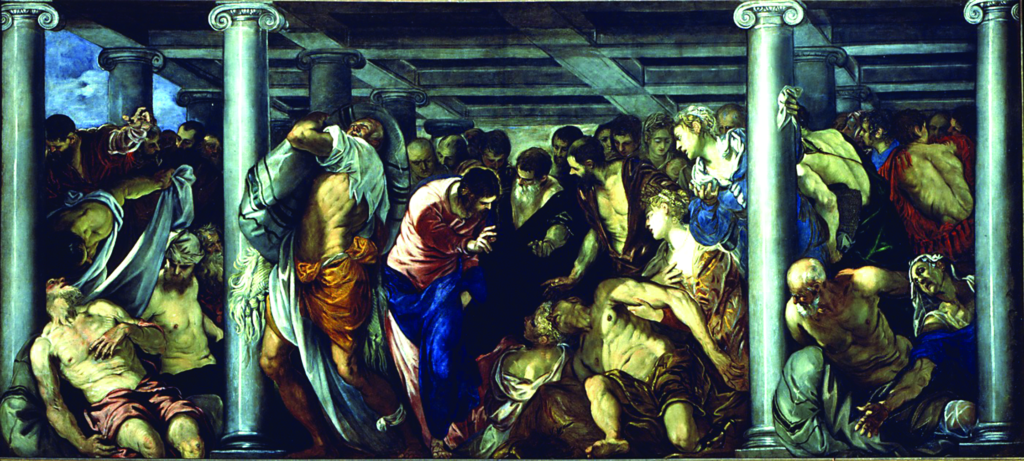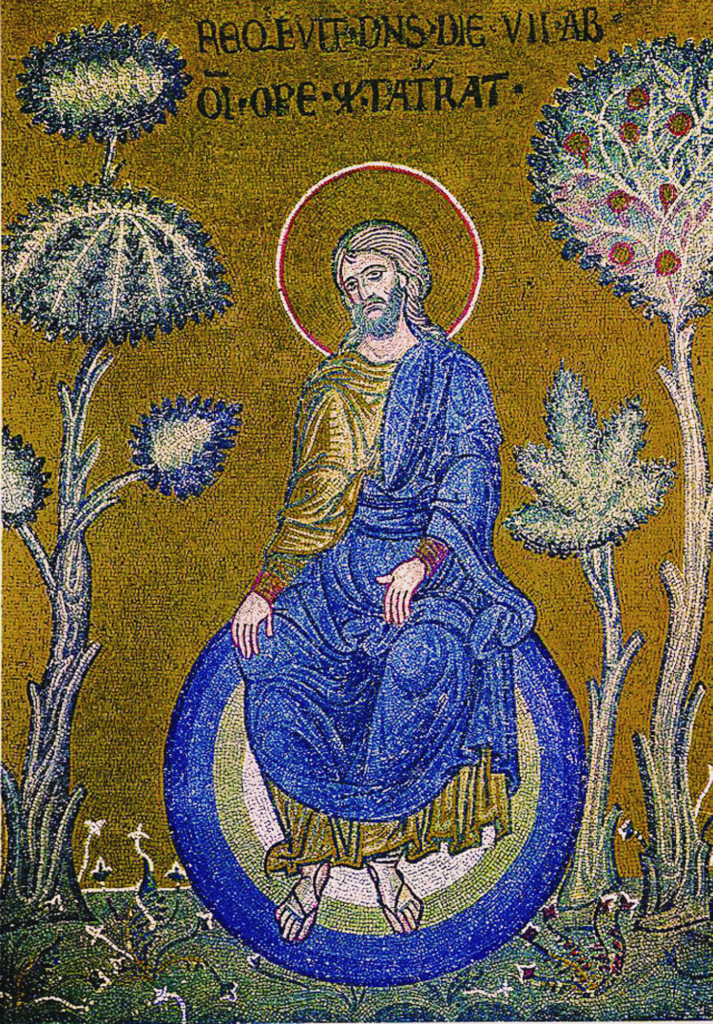Jesus heals on the Sabbath — shaking the foundations of earth and heaven
By Anthony Esolen

The Healing of the Paralytic by Tintoretto, Church of San Rocco, Venice
The Jews persecuted Jesus, says John, after He healed the crippled man at the pool, because He had done so on the Sabbath (John 5:17).
We are accustomed to taking their indignation as a form of religious rigorism. That is not incorrect, for after all Jesus does criticize the Scribes and the Pharisees, for they tithe their “mint, dill, and cumin” (Mt. 23:23), but leave undone the weightier matters of the law, such as justice, mercy, and faith. Those words are caustic indeed, as the spices Jesus names were not what cassia or cinnamon were — royal spices, precious, brought from afar. You could cull mint and dill and cumin from the weeds growing up behind your house — as you can do with oregano in Italy, and juniper berries in Norway. A tenth of nothing, we might say, is nothing, and unless you are giving it in love, you are either overscrupulous, or you want to play-act at righteousness, with yourself as your most admiring audience.
Yet I think we underestimate both the piety of the Jews in this case, and the challenge that Jesus is posing to them.
The Sabbath is a holy day not because God has arbitrarily determined it to be so. It is the aim and the summation of all His creative work, “for in six days the Lord made heaven and earth, the sea, and all that is in them, and rested on the seventh day” (Ex. 20:11), blessing it and making it holy. The seventh day, then, is God’s day, and man in his rest upon the seventh day is granted the great favor of participating in His everlasting life.
At stake here is no less than the revelation by Jesus not just of what He does, or what we should do by imitation of Him, but of who He is. Let us recall the scene.
Jesus has gone up to Jerusalem, and there He pauses at a pool called Bethesda, which John notes is a name in the Hebrew language (5:2). What is that name? It is the Bethchesed, the House of Mercy, or, more pointedly, the House of Grace. That is the crucial word here, and John has already made it plain that though the law was given by Moses, “grace and truth came by Jesus Christ” (Jn 1:17).
Not “given,” but, literally, came into being, came to pass. For “no one has ever seen God,” says John, and that includes Moses himself, but “the only-begotten Son of God, the One who is in the bosom of the Father” (Jn 1:18), has revealed Him to us. The Greek that John uses for the phrase I have italicized is ho on, the holy Name of God as rendered in the Septuagint: the Being, as we might say (cf. Ex 3:14).
Now the crippled man rises and walks. It does not violate the Sabbath to be standing on your feet and walking.
There are two problems here. One is that he is carrying his pallet, as Jesus commanded him to do, in the same breath as He commanded him to rise and walk. The other is that Jesus Himself appears to have worked.
I suppose it would have been no great loss to the crippled man to leave his pallet where it was. Perhaps he could have gone for it the next day, if no one had taken it in the meantime. It was probably a cheap thing, like a stretcher.
But Jesus commands him to carry it. He must have known what would happen. He is inviting a direct confrontation with His own people, some who would believe in Him, some who would not — though the emphasis in this scene is on those who would not. For when they accused him, Jesus replied, “My Father has worked, and so do I work” (John 5:17). I dearly wish we knew what Hebrew or Aramaic words Jesus uttered here. They might have been something like this: Yippa’al ha-Ab w’eppa’al; the point is that the very terseness of the Semitic language compels identification, and that is exactly how the Jews interpret it, for they see that Jesus has called God His Father, “making himself equal to God” (5:18; see Phil. 2:6 for the same expression).

“The Lord rested from all his work on the seventh day.” Mosaics in Monreale Cathedral, Italy
When men work, they perform ta’abod, service, labor; it is what Adam in the garden of Eden is going to do, tilling the earth, literally serving it, though when he is sinless it is not as a slave but as an earthly participant in God’s creative work (Gen. 2:5).
The Sabbath, then, substitutes one sort of work for another: the joyous work of worship for the laborious work of a man bent over his plow. But Jesus here is claiming to work as God works, and thus does He claim lordship over the Sabbath, giving to man the fruit of his work beyond that of the creation in the beginning. That is the very meaning of what might seem to us to be an abrupt transition to another subject entirely, when Jesus answers the disgruntled and says, “Just as the Father raises the dead, and gives them life, so the Son gives life to whomever he will” (Jn 5:21). God is the living God, and to give life, that is, to quicken, to bring to life again, is in the power of God alone. And there is the crux of the matter. Who is this Jesus?
It is possible, if we read the Gospels inattentively, to separate the person of Jesus from His words and teachings, in which case we might read Matthew, Mark, and Luke for those teachings, showing us how to live, while we ignore John as far too mysterious and other-worldly for our purposes. But Matthew, Mark, and Luke are also, and always, about who Jesus is, while John is also, and always, about what Jesus does and what He commands us to do. Yet we may grant that the focus in John is intense. The unbelieving hear, but do not really hear, the claim that Jesus makes that He and the Father are one, and that makes them doubt the works He does, even when He heals the man born blind. But Jesus urges them to reason in the reverse direction. If you see the works, you should trust them, and “believe that the Father is in me, and I in him” (Jn. 10:38). For if only God can do what Jesus has done, then we must conclude, though we may not understand it, that the works of God declare the glory of God. And if that is so, then the very Sabbath Himself has come among us. And that shakes the foundations of earth and heaven. We are far beyond the mere breach of a rule. The kingdom of God is at hand.






Facebook Comments